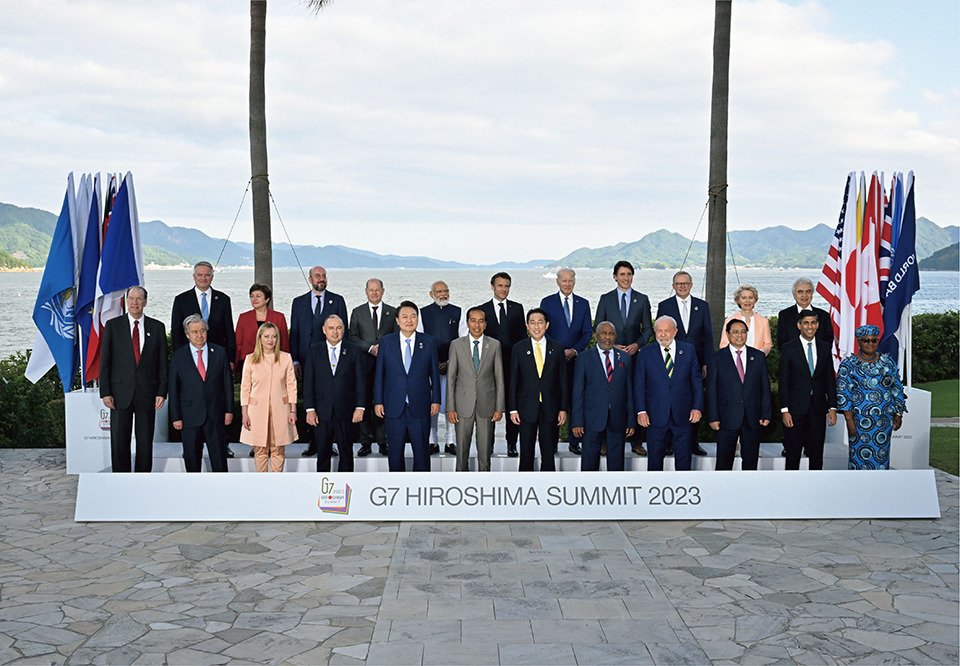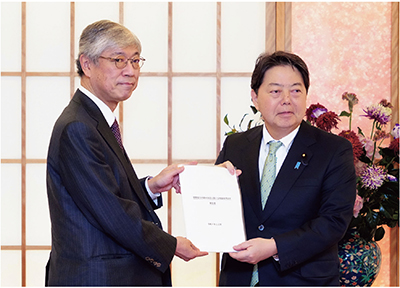Part I Revision of the Development Cooperation Charter and G7 Hiroshima Summit

Prime Minister Kishida, Chair of the G7 Hiroshima Summit, leaders of the other G7 and invited countries, and heads of international organizations at the Summit in May 2023
Amid the world being at a historic turning point and facing multiple crises, it is increasingly important for the international community to transcend differences in values and cooperate with each other. At the same time, building a peaceful, stable, and prosperous international community under a free and open international order based on the rule of law directly leads to Japan’s national interests. To this end, the role of development cooperation, one of the most important tools of Japan’s diplomacy, is becoming increasingly important.
In light of these significant changes in the situation, Japan announced in September 2022 that it would revise the Development Cooperation Charter, which articulates the basic policy of Japan’s development cooperation policies. In June 2023, the Cabinet decided on the revision of the Development Cooperation Charter for the first time in eight years.
At the G7 Hiroshima Summit held under Japan’s Presidency in May 2023, Prime Minister Kishida led discussions addressing key challenges faced by the international community, including development issues.
1 Revision of the Development Cooperation Charter
The Development Cooperation Charter is a policy document that Japan’s development cooperation policy is founded on. Its predecessor, the ODA Charter, was formulated in 1992. The name was changed to the Development Cooperation Charter when it was revised in 2015. The new Development Cooperation Charter was decided by the Cabinet on June 9, 2023.
(1) Background to the Revision of the Charter

Mr. NAKANISHI Hiroshi, chair of the “Advisory Panel on the revision of the Development Cooperation Charter” and Professor at the Graduate School of Law, Kyoto University, submitting the report of the Advisory Panel to then Foreign Minister Hayashi
Since the revision of the Charter in February 2015, many efforts have been made in order to address global issues through international cooperation, such as the adoption of the Sustainable Development Goals (SDGs) and entry into force of the Paris Agreement on climate change. On the other hand, the free and open international order that supported peace and prosperity in the post-Cold War era faces severe challenges, and the international community is becoming increasingly fragmented and confrontational. The economy and security are now directly linked and impact each country, which is visible in the disruption of global supply chains due to rapidly changing international affairs, cybersecurity issues arising from rapid digitalization, and attempts to use economic dependence as a means of coercion.
With the world exposed to such uncertainty, developing countries face difficulties in charting a path to stable development. Poverty reduction efforts have become less likely to be addressed, and health issues, including infectious diseases, climate change, and environmental issues, have become more serious. Furthermore, refugees and displaced persons have increased all over the world, and food and energy crises have exacerbated humanitarian situations. Responses in accordance with the concept of human security are urgently needed. The role of development cooperation becomes exceptionally vital, and a variety of actors, including the business community and civil society, are required to work together to address the situation.
In the meantime, as debt issues have become more serious in some developing countries, there is an increasing need for the international community as a whole to ensure development cooperation based on transparent and fair international rules. Furthermore, as the financing gap for achieving the SDGs is widening, it has become increasingly important to collaborate with various actors, including private companies, public financial institutions, international organizations, and civil society, as well as to make efforts to mobilize new funds.
In light of these significant changes in the situation since the Charter was formulated in 2015, the current revision aims to promote ODA that not only addresses the challenges faced by developing countries but also contributes to Japan’s economic and social growth, by making use of development cooperation more effectively and strategically than ever as one of the most important tools of diplomacy.
The new Charter outlines the direction of Japan’s development cooperation over the next approximately 10 years. In making the revision, the opinions of a wide range of experts and Japanese citizens were considered. These included recommendations by the Advisory Panel on the revision of the Development Cooperation Charter, exchanges of opinions with various sectors such as the business community and civil society, public opinion exchange meetings held in multiple locations in Japan, and public comments.
